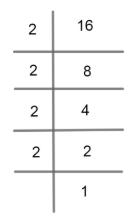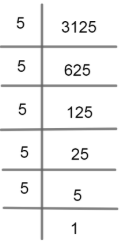
Write down the decimal expression of $\dfrac{{16}}{{3125}}$ without actual division.
Answer
520k+ views
Hint: To find the decimal expansion of a number without actually dividing the numbers, we will multiply both the numerators and denominators with a constant k. We will first find the value of k and then we will multiply such that the denominator becomes in the form of ${10^n}$ where n is an integer.
Complete step-by-step solution -
To solve the question we will multiply both the numerators and denominators with a constant k. The constant k should be such that when it is multiplied to the denominator, it is converted to the form ${10^n}$, where n is an integer. To find the value of k, first, we will find the prime factors of both the numerators and denominators. The prime factors of the numerator $\left( { = 16} \right)$ are:

Thus, we can say that, $16 = 2 \times 2 \times 2 \times 2$. Now, we will calculate the prime factors of 3125:

Thus, we can say that,
$3125 = 5 \times 5 \times 5 \times 5 \times 5$
Now, we will write $\dfrac{{16}}{{3125}}$ in the form of prime factors of numerator and denominator:
$\dfrac{{16}}{{3125}} = \dfrac{{2 \times 2 \times 2 \times 2}}{{5 \times 5 \times 5 \times 5 \times 5}}$
Now, in the denominator we have five 5s. If we multiply each 5 by 2 then it will become 10 and the denominator will be changed into a power of 10. Thus, we will multiply the denominator by $2 \times 2 \times 2 \times 2 \times 2$. We will also multiply the same to the numerator so that the value of the fraction remains the same. Thus, after multiplication, we get the following:
$ \Rightarrow \dfrac{{16}}{{3125}} = \dfrac{{2 \times 2 \times 2 \times 2}}{{5 \times 5 \times 5 \times 5 \times 5}} \times \dfrac{{2 \times 2 \times 2 \times 2 \times 2}}{{2 \times 2 \times 2 \times 2 \times 2}}$
$ \Rightarrow \dfrac{{16}}{{3125}} = \dfrac{{2 \times 2 \times 2 \times 2 \times 2 \times 2 \times 2 \times 2 \times 2}}{{5 \times 5 \times 5 \times 5 \times 5 \times 2 \times 2 \times 2 \times 2 \times 2}}$
$ \Rightarrow \dfrac{{16}}{{3125}} = \dfrac{{{2^9}}}{{10 \times 10 \times 10 \times 10 \times 10}}$
$ \Rightarrow \dfrac{{16}}{{3125}} = \dfrac{{{2^9}}}{{100000}}$
$ \Rightarrow \dfrac{{16}}{{3125}} = \dfrac{{512}}{{100000}}$
We know that $\dfrac{1}{{100000}} = 0.00001$
So, $\dfrac{{512}}{{100000}} = 512 \times \dfrac{1}{{100000}} = 512 \times 0.00001$
$ = 0.00512$
Thus, $\dfrac{{16}}{{3125}} = 0.00512$.
Note: We can use this method only when the denominator contains the power of 2 and 5 only. In case, if there is a power of some other prime number then this method will not be applicable.
Complete step-by-step solution -
To solve the question we will multiply both the numerators and denominators with a constant k. The constant k should be such that when it is multiplied to the denominator, it is converted to the form ${10^n}$, where n is an integer. To find the value of k, first, we will find the prime factors of both the numerators and denominators. The prime factors of the numerator $\left( { = 16} \right)$ are:

Thus, we can say that, $16 = 2 \times 2 \times 2 \times 2$. Now, we will calculate the prime factors of 3125:

Thus, we can say that,
$3125 = 5 \times 5 \times 5 \times 5 \times 5$
Now, we will write $\dfrac{{16}}{{3125}}$ in the form of prime factors of numerator and denominator:
$\dfrac{{16}}{{3125}} = \dfrac{{2 \times 2 \times 2 \times 2}}{{5 \times 5 \times 5 \times 5 \times 5}}$
Now, in the denominator we have five 5s. If we multiply each 5 by 2 then it will become 10 and the denominator will be changed into a power of 10. Thus, we will multiply the denominator by $2 \times 2 \times 2 \times 2 \times 2$. We will also multiply the same to the numerator so that the value of the fraction remains the same. Thus, after multiplication, we get the following:
$ \Rightarrow \dfrac{{16}}{{3125}} = \dfrac{{2 \times 2 \times 2 \times 2}}{{5 \times 5 \times 5 \times 5 \times 5}} \times \dfrac{{2 \times 2 \times 2 \times 2 \times 2}}{{2 \times 2 \times 2 \times 2 \times 2}}$
$ \Rightarrow \dfrac{{16}}{{3125}} = \dfrac{{2 \times 2 \times 2 \times 2 \times 2 \times 2 \times 2 \times 2 \times 2}}{{5 \times 5 \times 5 \times 5 \times 5 \times 2 \times 2 \times 2 \times 2 \times 2}}$
$ \Rightarrow \dfrac{{16}}{{3125}} = \dfrac{{{2^9}}}{{10 \times 10 \times 10 \times 10 \times 10}}$
$ \Rightarrow \dfrac{{16}}{{3125}} = \dfrac{{{2^9}}}{{100000}}$
$ \Rightarrow \dfrac{{16}}{{3125}} = \dfrac{{512}}{{100000}}$
We know that $\dfrac{1}{{100000}} = 0.00001$
So, $\dfrac{{512}}{{100000}} = 512 \times \dfrac{1}{{100000}} = 512 \times 0.00001$
$ = 0.00512$
Thus, $\dfrac{{16}}{{3125}} = 0.00512$.
Note: We can use this method only when the denominator contains the power of 2 and 5 only. In case, if there is a power of some other prime number then this method will not be applicable.
Recently Updated Pages
Master Class 10 Computer Science: Engaging Questions & Answers for Success

Master Class 10 General Knowledge: Engaging Questions & Answers for Success

Master Class 10 English: Engaging Questions & Answers for Success

Master Class 10 Social Science: Engaging Questions & Answers for Success

Master Class 10 Maths: Engaging Questions & Answers for Success

Master Class 10 Science: Engaging Questions & Answers for Success

Trending doubts
What is the median of the first 10 natural numbers class 10 maths CBSE

Which women's tennis player has 24 Grand Slam singles titles?

Who is the Brand Ambassador of Incredible India?

Why is there a time difference of about 5 hours between class 10 social science CBSE

Write a letter to the principal requesting him to grant class 10 english CBSE

A moving boat is observed from the top of a 150 m high class 10 maths CBSE




